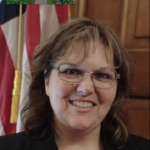Will you support both legislation and funding that will increase election transparency to ensure that voters from across the state know their vote is counted?
The SoS and election administrators throughout the state rely on funding to support translated ballots, public meeting streaming services, and getting information out to the public by mail, ads, etc. The SoS offices have worked to increase transparency on a state level, and the digital access is able to reach many more Michiganders throughout the state.
It seems there may still be opportunity for building awareness to citizens throughout the state of these tools and services, as well as finding new ways to reach those without access to the internet.
Will you support legislation that allows for the pre-processing of absentee ballots?
Since 2018, when a ballot proposal overwhelmingly was passed by voters that gave way to no-reason absentee voting, the number of voters utilizing this tool has skyrocketed. In 2020, 60% of voters chose to use absentee ballots during the pandemic, and even this year during the 2022 primary election, 50% of voters voted absentee.
There has been bi-partisan support of clerks and election officials to allow additional time to process absentee ballots, prior to election day, as a part of common-sense election reform. Additionally, there is a significant increase in unrest and disinformation that runs rampant while voters wait past Election Day for results.
Will you support legislation that will increase government transparency to increase citizen confidence?
In Michigan, the individual legislators and the governor are not subject to FOIA, and Michigan is one of only two states where that is the case. This is different from the state departments, county commissioners and other local offices that are subject to FOIA.
By ensuring these individuals and offices must abide by FOIA will create additional transparency, show the backend and internal decision-making process, and will greatly increase confidence in our elected officials and provide for open accountability to those offices.
Additionally, the COVID-19 crisis exacerbated the impacts of government transparency through accessibility and notifications that have always been there. Streamlining access points, using consistent platforms, revising the notification process to the public for earlier and more consistent notice, and creating more accessibility for citizens that have various disabilities, limited access to transportation, and language barriers can be improved.
There are currently certain ways to watch the legislative sessions virtually, and many offices have been able to find ways to accommodate virtual options since 2020. This greatly increased public participation, and should be the basis for new norms. By solidifying and ensuring these practices continue and are improved upon, it encourages citizen engagement.
Will you support requiring public disclosure of all transactions for administrative accounts tied to lawmakers?
Requiring public disclosure of all transactions for administrative accounts tied to lawmakers would shine new light on how extensively these funds are used to conceal the identities of donors and what the money is spent on; remove the financial barriers stopping everyday people from running for office.
Campaign finance reform would help to close the loopholes that have undermined the sanctity of the democratic process and our elections. It will go a long way in rebuilding trust with citizens by knowing that their elected officials were not brought into office by money that could influence their votes.
Will you support significantly limiting legislative action during the period between the election and the swearing in of the new Legislature, also known as Lame Duck?
After each November election between Thanksgiving recess and the end of the year, the state legislature conducts legislative business, otherwise known as the Lame Duck Session. When passed legislation is not on the Governor’s desk before the session is adjourned, that legislation must be re-introduced during the next session – essentially starting from scratch with a new legislative body.
The time frame is short and is often used by term-limited legislators to push mass amounts of legislation that is often controversial through. Sessions often last throughout the night, in turn limiting public input and the ability for legislators to truly read, vet, and understand the legislation presented.
By either limiting or eliminating the legislative lame-duck session would prevent bad legislation from slipping through the cracks that are often partisan. It would additionally ensure legislators have proper debate and ability for public input before elections take place – when voters can hold leaders accountable – rather than after.












